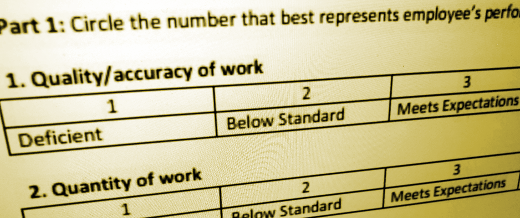Penalizing Managers For Giving Bad Reviews As Afterthought

As the new year starts, for many it is also the start of the annual review process with their employer. Where this process varies from company to company, typically it entails creating goals for the coming year, taking into consideration the goals for the team, organization, group etc. and then at the end of the year measuring if you met those goals or not along with feedback that was accumulated throughout the year.
Ask any person who goes through this process and they will likely tell you they would rather spend time standing in line at the DMV! Many people feel it's a waste of time, not only in the fact that they have to spend time working on it but also at the end of the year a couple of things typically happen - one, they don't get a raise or a bonus, and two, for the first time they learn at the end of the year of something that happened months ago or even earlier in the year.
When you get written up on something in December that happened in March, how can you really do anything about it, nine months later, to affect any change? In other words, the performance appraisal process is broken, and I have an idea to fix it -penalize the manager that gives you a poor review or feedback at the end of the year as an afterthought when they had the opportunity to tell you earlier.
Say what?
If you think about it, at the end of the year when someone is giving you a review, their own personal review doesn't necessarily reflect yours. It should, for a manager should be measured on the overall performance of their team, as they should be ensuring their team is excelling at all times. Some manager do believe in this (including, fortunately, the manager I have now), however many managers don't want to be bothered by this throughout the year and as a result giving a poor performance review at the end of the year is really no skin off their teeth and comes naturally to them. Sometimes that poor performance review is based on asking others who have worked with you to provide their input, which is often referred to as a 360° review process. Even when organizations say they have a "immediate feedback mechanism" to let people know when they do well or when they do poorly, it rarely happens this way. Finding out about a problem at the end of the year when there's really nothing that can be done about it serves nobody well.
If the person giving the negative feedback is giving it too late, it is they themselves that should be marked down for it in the end of the year process. This gives the person giving the poor review skin in the game and makes them part of the solution. The whole idea is to inform people at the time something happens that something was unsatisfactory or could've been done better or could've been corrected. When it's given at that point, the person that has the opportunity to make the correction, discuss impacts on their workload that impacts their success, identify the need for education or training or greater organizational issues that need to be addressed that the manager may not even be aware of, et. al. The person and their manager or whomever is giving the negative feedback can then together put a plan in place to lead to success, along with a timeframe and measurement.
Been there, wish it was done
Many times throughout my career I have been on the receiving end of negative feedback too late to do anything about it. When I asked why nothing was brought up sooner, I was never given a definitive answer, namely as the review process did not require it. On the flipside, I have had many managers who gave me continuous feedback, comments, adjustments, etc. as I worked with them, and this was not only greatly appreciated but led to my success and the success of the project I was working on. I also hear this from friends and colleagues that hear of such late-in-the-game feedback they can do nothing about, which simply makes the workplace even less tolerable.
Deconstructing Giving Timely Feedback
Why not strike while the iron is hot, and give feedback while it is fresh, meaningful and can produce a positive outcome? This takes facing issues head-on, something many managers may not be comfortable with or other senior people don't want to be bothered with. By making these mid-game corrections, it allows everyone to succeed, and may also impact the bottom line of the team or organization. This investment in one's team is as important as any training or materials you spend money on them, and can reap even greater rewards.
This is from The Hot Iron, a journal on business and technology by Mike Maddaloni.
Did you enjoy this? Subscribe to The Hot Iron by RSS/XML feed or Read by Email.
Business • Strategize • Thrive • (0) Comments • Permalink
Comments
Post a Comment
Note: Comment moderation is active, and your comment will be viewable once it is reviewed.



